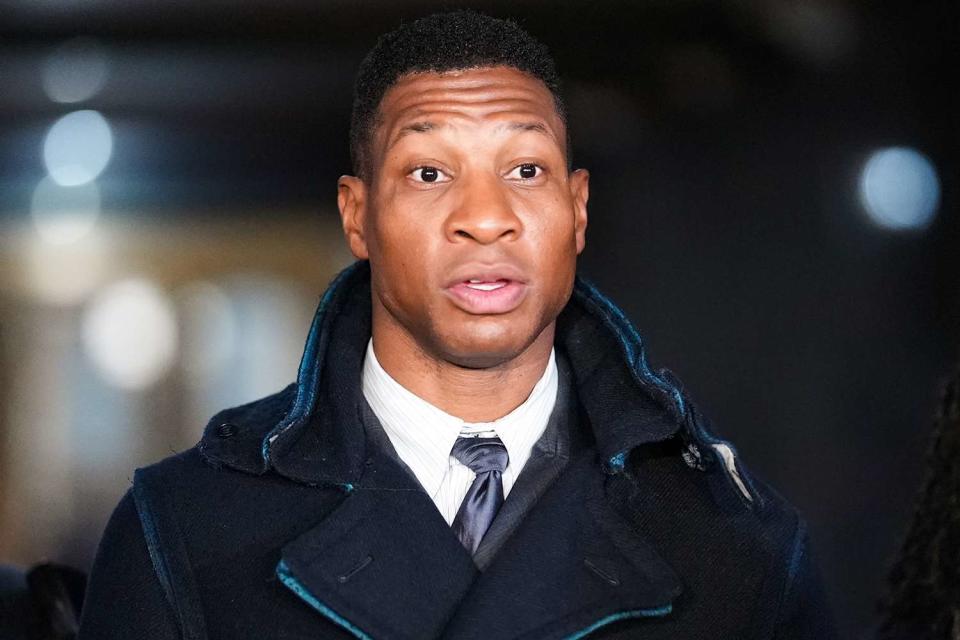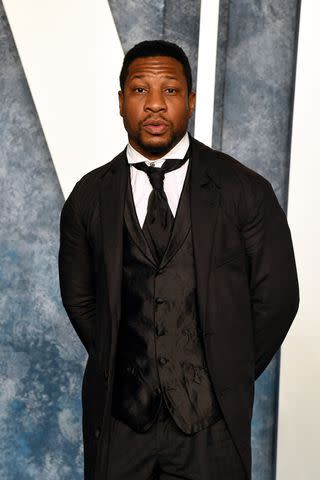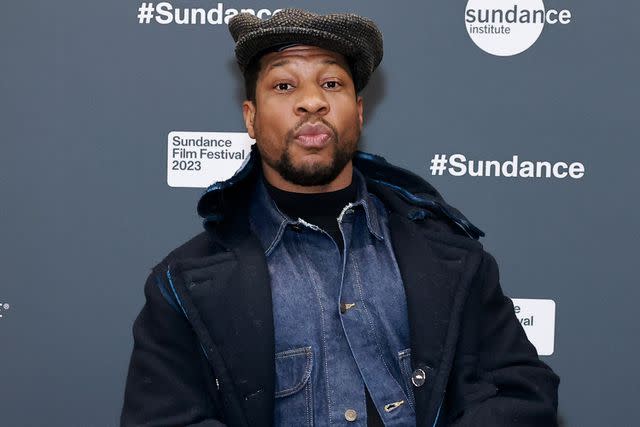Why Jonathan Majors' Sentencing Was Delayed Until April and What Could Happen Next: Experts Explain
The actor's rescheduled sentencing hearing is now set for April 8

John Nacion/Getty Images
Jonathan Majors on Dec. 15, 2023.Jonathan Majors did not come to court in person on the day of his scheduled sentencing in his domestic violence case.
Instead, the 34-year-old actor, convicted of assault and harassment in December, appeared virtually on a video call for a hearing in which his lawyers delayed the sentencing with a routine motion filed yesterday to set aside the verdict.
The judge plans to rule on the motion ahead of the actor’s new sentencing hearing set for Monday, April 8.
In the nearly-5-minute hearing in Manhattan Tuesday, the judge reminded Majors of the order of protection prohibiting him from any interactions with his ex-girlfriend Grace Jabbari, 31, who testified at trial that he had physically attacked her during a fight that spilled onto the streets of New York City in March 2023.
Related: A Timeline of Jonathan Majors' Legal Troubles: From His March Arrest to Assault Trial
Majors told the judge, "Yes, sir." He leaned back in his chair and a court officer disconnected the call.
It was a quick end to a relatively eventless court day and one that plays in stark contrast to the whirlwind of the last seven weeks. Since his Dec. 18 conviction, his acting career has taken a devastating turn, losing several already-cast roles.
Here, legal experts reflect on what went wrong for the Creed III actor and where he can go from here.
Never miss a story — sign up for PEOPLE's free daily newsletter to stay up-to-date on the best of what PEOPLE has to offer, from juicy celebrity news to compelling human interest stories.

Jon Kopaloff/Getty
Jonathan Majors on March 12, 2023A Look at the Convicted Charges
Legal experts tell PEOPLE going to trial for misdemeanor assault charges was an unusual choice, with few cases not involving higher-end felony charges ever playing out in a courtroom.
In the fall, Majors rolled the dice on a straight not-guilty verdict in what appeared to be an attempt to save his career, says entertainment attorney Tre Lovell, who is not connected to the case.
Taking the stand at the start of the actor’s trial, Jabbari described that March night, saying after an evening out, the couple was inside a hired car heading back to the penthouse they shared, when she saw a text message from another woman on Majors’ phone. She said she took the phone from his hands and Majors then twisted her right arm. As she curled her body “just trying to protect myself,” she said she felt “a really hard blow against my head" that “took me aback.”
Ultimately, Jabbari went to the hospital and was treated for a hairline fracture to a bone in her middle finger and a cut to her ear.
“From a legal perspective, it would have made better sense to take a plea deal,” Lovell says. “Because that would have guaranteed Majors no jail time, kept the evidence used at trial private — which the press is now trying to unseal — and allowed the matter to disappear in the public view.”
In a split verdict in December, Majors was convicted of two of the four charges against him: third degree misdemeanor assault, recklessly causing physical injury, as well as second degree harassment, the latter of which is a violation, a charge so small Lovell likens it to “a traffic ticket.”
Related: Jonathan Majors to No Longer Portray Dennis Rodman in Biopic Following Guilty Verdict: Report

Arturo Holmes/2023 Getty
Jonathan Majors on Jan. 20, 2023.The Actor Speaks Out
While the charges, once he is sentenced, could carry up to a year behind bars, the repercussions to his career have been more immediate.
In the midst of his career fallout, Majors finally spoke about his criminal conviction in an interview with ABC News last month, saying he was “absolutely shocked and afraid” of the conviction, insisting on his innocence and suggesting that the evidence presented at trial did not warrant a conviction.
Former federal prosecutor Neama Rahmani tells PEOPLE that such an appeal to the public’s sympathy was “probably too little, too late to save Majors’ career.”
“In hindsight, it was a mistake for Majors not to take the stand,” she says of Majors’ decision not to testify at trial, adding: “If Majors wanted to tell his story, he should have told the jurors.”
Instead, over the several week trial, jurors heard from the actor’s ex-girlfriend Jabbari, listened to audio from one of their fights in which Majors declared himself a “great man,” saying he needed a “Michelle Obama” or “Coretta Scott King” to support him, and read the couple’s text messages in which Majors instructed Jabbari not to go to the hospital for an injury from a previous alleged attack.
Now, as the case slogs toward sentencing, Lovell says “the case is having a devastating impact on his career” but “he can make a comeback.”
“Many actors have come back from previous convictions and allegations of domestic violence,” he adds.
With a strong PR campaign and charity work, Lovell says Majors can craft for himself a “new image” — one that “can replace the image the verdict painted.”
“But,” he adds, "it will be a process that may take a few years.”
If you are experiencing domestic violence, call the National Domestic Violence Hotline at 1-800-799-7233, or go to thehotline.org. All calls are toll-free and confidential. The hotline is available 24/7 in more than 170 languages.
For more People news, make sure to sign up for our newsletter!
Read the original article on People.


